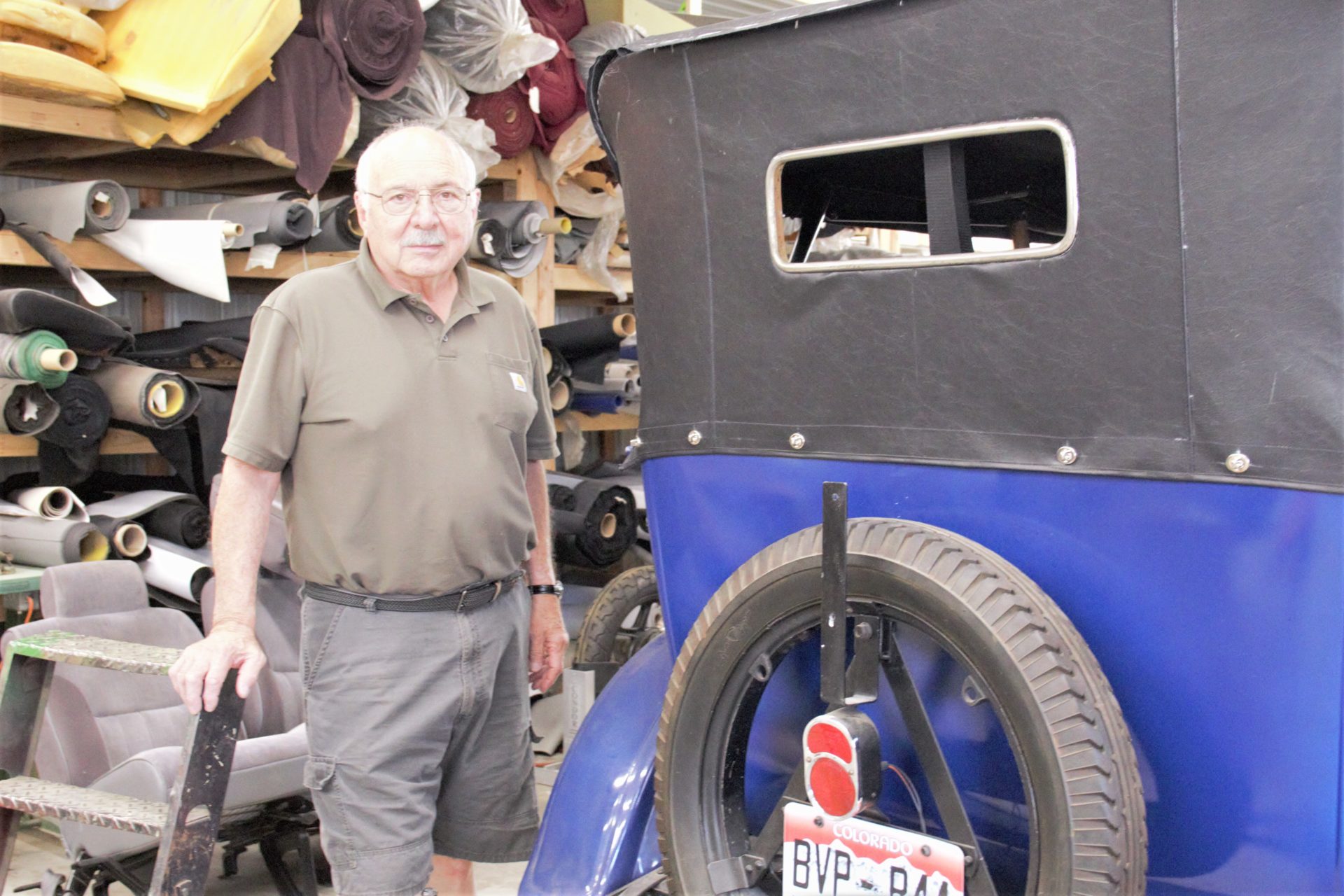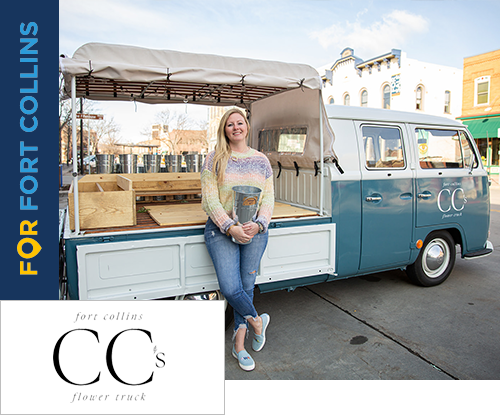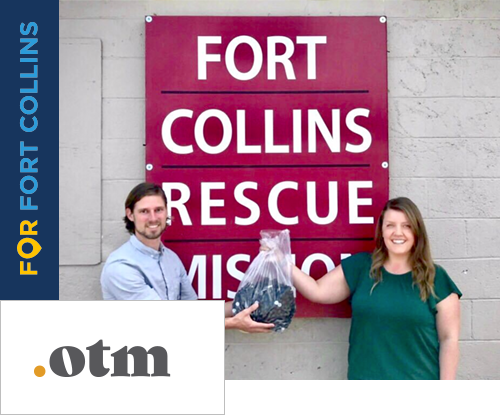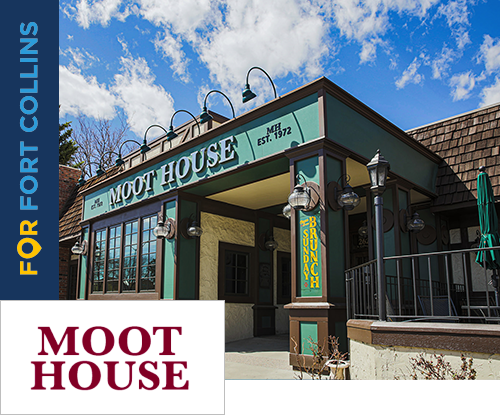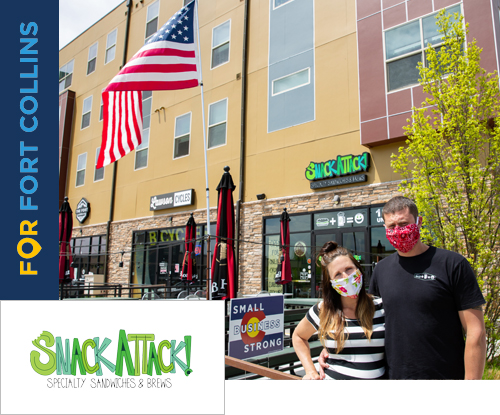Interview with Richard Cienfuegos Owner of Joe’s Auto Upholstery. Be sure to follow Joe’s Auto Upholstery on Facebook.
Editor’s Note: The phrasing and word choice in this interview have been edited for clarity but maintain meaning.
What is the story behind Joe’s Auto Upholstery?
My dad, Joe Cienfuegos, was a prisoner of war. [He was asked] what profession he wanted when he got out of the war camp, [and he said] auto-body work or upholstery. He was sent to San Francisco and took up auto body painting and leading in cars, but it was really toxic, so he decided to come back to Fort Collins. He applied again through the VA (Veterans Affairs Department), and they gave him a grant to begin training under Bill Hawley, who had an upholstery shop at 247 Linden St. Within one year, my dad was ready to buy the business because he was making more than the owner of the shop. [One day] dad had a chance to buy the shop and he bought it, and that’s where it’s been for seventy years.
Who was Joe?
My dad’s name was Constancio, but all his friends called him Joe because they couldn’t pronounce his real name. So, he put up the signs as Joe’s Auto Upholstery, and it’s been that way for seventy years.
He was born in Cusihuiriachi, Chihuahua, Mexico. Pancho Villa was really active at that time, and one day, one of Pancho Villa’s men came to the little farm where my dad lived with his family. He asked them, “who do you pledge allegiance to?” Of course, they said Pancho Villa; it was one of Pancho Villa’s men. They said “There’s nothing we won’t do for Pancho Villa. Whatever he wants, we’ll help.” But the men went back to camp that night and told Pancho Villa, “there was nothing they will do for you,” instead of nothing they won’t do for you. So Pancho Villa said, “go back in the morning, kill everybody, take anything that’s of value, and bring it back to our camp.” My dad ‘s neighbor was there, and [in the middle of the night] he rode to their ranch and said “Pancho Villa is coming in the morning to kill you, you’d better leave,” so that’s how my dad and his family ended up in El Paso, Texas.
From there, Grandma saw a sign at the railroad station that said they needed laborers to work the beet fields, and they got free transportation from El Paso, Texas to Fort Collins, Colorado. My dad was three years old at the time and had four brothers and sisters.
What are some of your childhood memories of Joe’s Auto Upholstery and living in Fort Collins?
My dad was a sharp businessman. He’d give people prices and then he would test them when they come back. My dad would say, “what price did I give you,” and they’d say, “oh Joe, I don’t remember.” Dad would price it higher than what he had originally said, and they’d say, “no Joe, you told me it was this price.” Dad would say, “you knew the answer, then.” He tested them time after time, and some people would give him the correct price right away, and other people would try to get a lesser price. I don’t why he did it, but he did it to almost every customer. I write my prices.
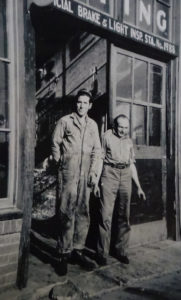 I started working with dad when I was around eight years old because I decided picking beans for two cents a pound wasn’t a money maker. We’d pick cherries in Loveland and in Waverly out here for fifty-one cents per flat. You don’t make any money doing that migrant work. I never picked pickles and I never did beets; that’s hard labor.
I started working with dad when I was around eight years old because I decided picking beans for two cents a pound wasn’t a money maker. We’d pick cherries in Loveland and in Waverly out here for fifty-one cents per flat. You don’t make any money doing that migrant work. I never picked pickles and I never did beets; that’s hard labor.
My dad used to get paid eight dollars/acre for [the whole] season. He had to block the plants, weed them three times, and at the end of the season after the pulling machine pulled the beats up, they had to top the beats. They didn’t get paid until the season was over. The whole family working there, everybody got into the beet fields. Everyone had to work. They traveled from here to Wyoming to Scottsbluff Nebraska and they worked all the beets around here that they could.
We lived in “The Colonia,” [which] was a smaller neighborhood over here that the Great Western Sugar Company had for the laborers. Eventually, the people start buying houses and that’s where we bought our first house was down in the Colonia. A lot of good people lived there. They were mostly migrant workers, all Latinos.
At that time, the city was small, and everybody knew everybody. We looked forward to coming to town. The theaters were 15 cents, and there were double features back then with a cartoon and a news reel. Dad used to give us a quarter and we would buy a candy bar before the first feature and then at intermission we’d go and buy another candy bar; so, we used to get two candy bars and a movie for a quarter. There was the lyric theater, the trail, the state, there were some good theaters here. [We would do that] almost every Saturday. Me and my older brother Joe would go to the theater and my folks would do the grocery shopping on Saturday afternoons.
The only thing I remember [that happened to my dad] was that we were going to buy a house, and one of [dad’s] customers was a realtor. He said, “Come on, I’ll show you some houses.” So, Dad got in the car with him, and they went up and down Cherry street and clear up to Shield street and then back down on Maple and then dad asked him, “what about some other houses on the other side over there by the university? I can buy almost any house.” At that time dad was making good money, but the realtor said, “Joe, we can’t show you any houses south of Mountain Avenue. All Hispanics will be on the north side of Mountain. That’s why Cherry Street, Maple, Loomis is all Latinos. They didn’t want Mexicans on that side of town. That’s the only thing I really remember.
We moved to Wood Street, and they were building new houses down in the six-hundred-block of Wood Street. Dad was working on the contractor’s truck and said, “we like those houses down there.” The guy came out and said, “Joe we won’t sell to you because you’re Mexican.”
How would you like the community to celebrate Hispanic Heritage Month?
By recognizing the contribution that the Hispanic community brought and is bringing to the area. Hard working people that come to prosper and that the only thing they are looking for is a better life.
Why do you think it’s important for our community to celebrate Hispanic Heritage Month?
The Hispanic community is among the hardest working people and the finest craftsman and the contribution over the years has been fundamental in the foundation of this country.
Do you feel like there’s a special communication among businesses and business owners?
We all get along great. Now, some families don’t get along with other families, but as businesspeople we all get along really well. We refer people to other customers you know, and other customers to other businesses; it works out really well. The people I know, I favor. I’ll recommend some people, but I’ll also warn against others. There are people that have gotten rich by cheating people, and I’d rather stay away from that type.
